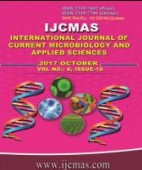


 National Academy of Agricultural Sciences (NAAS)
National Academy of Agricultural Sciences (NAAS)

|
PRINT ISSN : 2319-7692
Online ISSN : 2319-7706 Issues : 12 per year Publisher : Excellent Publishers Email : editorijcmas@gmail.com / submit@ijcmas.com Editor-in-chief: Dr.M.Prakash Index Copernicus ICV 2018: 95.39 NAAS RATING 2020: 5.38 |
Hybrid breeding programs involves large number of combinations made and evaluated, only a few are selected. Therefore, it is very important to explore alternative approaches to enhance the selection efficiency and to predict hybrid performance. In the present study, a set of 30 hybrids derived from crosses between 10 tropical japonica lines and 3 indica were analyzed for heterosis, per-day productivity, yield efficiency and an association index were established between yield and molecular marker amplification pattern. The heterosis value varied from -80.73% to 14.95% over the selected standard check. Parental lines of all the hybrids were characterized using a set of 40 uniformly distributed hypervariable microsatellite markers. A total of 131 allelic fragments with an average of 3.28 alleles per locus amplified, indicated presence of polymorphism among the rice lines. Similarity coefficients ranged from 0.58 to 0.83. Coefficient of marker polymorphism (CMP) for each hybrid was calculated based on extent of polymorphism among the parental lines of the hybrid with respect to markers analyzed. Association of CMP with the standard heterosis for grain yield, showed positive correlation (r = 0.227), indicating the strong utility of the selected microsatellite markers with PIC ≥ 0.5 for prediction of heterosis.
 |
 |
 |
 |
 |